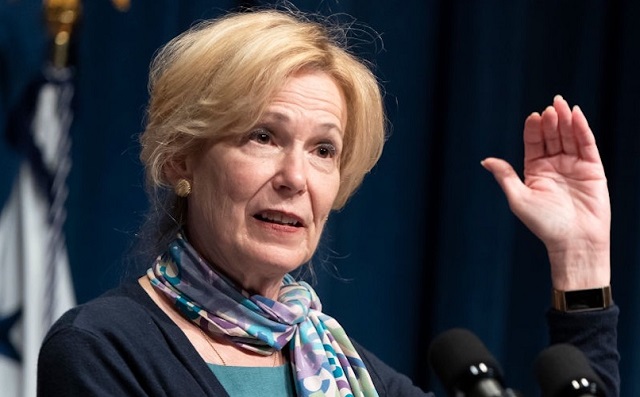Alberta
2022 – the year fossil fuels once again became a preferred source of reliable, affordable energy

A worker walks past gas pipes at Uniper’s new LNG import terminal in Wilhelmshaven, northern Germany on December 17, 2022. Getty Images photo
From the Canadian Energy Centre Ltd.
By David Yager
David Yager is an oilfield service executive, oil and gas writer, and energy policy analyst. He is author of From Miracle to Menace – Alberta, A Carbon Story.
The only part of the demise of oil and gas that was successful was reduced supply
It seems like just the other day the wrath of the world was coming down on oil sands and coal.
To protect the atmosphere, Canada has been reducing coal-fired power generation for years. It started in Ontario then moved to Alberta. Saskatchewan is next. New Brunswick is supposed to stop by 2030, but that province claims it can’t be done.
Global coal consumption is rising again because it meets the cost and availability requirement created by energy shortages and rising prices. On December 16, the International Energy Agency reported, “The world’s coal consumption is set to reach a new high in 2022 as the energy crisis shakes markets.”
For energy, the biggest single change in 2022 is the remarkable shift in public attitudes towards fossil fuels.
The global energy complex is under assault by Russia’s invasion of Ukraine, the exposed shortcomings of wind and solar, years of underinvestment in fossil fuels, and rising inflation and interest rates.
But for the past ten years, there has been an all-out crusade against fossil fuels. Oil company CEOs were branded climate criminals. It was morally reprehensible to own fossil fuel company shares or loan money to oil, gas or coal producers. Elections were won in Canada, the US and in Europe on pledges to replace fossil fuels.
No cost was too great, because the cost of doing nothing thus permitting unchecked climate damage was greater.
What happened? How did the channel change to rapidly? Why after years of public and political attacks on the source of over 80 per cent of the world primary energy, has affordable energy on demand now become more important than where it comes from?
Price, the most fundamental driver of economics and human behavior.
The November 2022 global survey from public opinion research firm IPSOS titled “What Worries The World” tells the story.
IPSOS explains, “This 29-country Global Advisor survey was conducted…among 20,466 adults aged 18-74 in Canada, Israel, Malaysia, South Africa, Turkey and the United States, 20-74 in Indonesia and Thailand, and 16-74 in all 21 other countries.”

IPSOS charts the top six issues for the past two years. Poverty, crime, unemployment and corruption have always been important, and consistently ranked among the top five.
But in November 2020, inflation only registered among eight per cent of respondents. Two years later it is 42 per cent. Coronavirus and the unemployment that accompanied the lockdowns were the top two issues. The others remain in a consistent range.
Two years ago was the peak of the “oil is dead” mantra, and when many bright ideas for a fossil fuel free future were concocted. In a post-pandemic world, multiple voices claimed we must Build Back Better, ensure a Resilient Recovery, engineer the Great Reset.
The plan was to use government policy and borrowed money to create jobs through the large-scale replacement of fossil fuels.
Coined the “energy transition,” it was achievable and inevitable thanks to incredible advances in renewable energy cost and supply. Canada – the world’s fifth largest combined oil and gas producer – could lead the charge with minimal disruption thanks to a new federally-funded retraining program for displaced oil workers. This was called a Just Transition.
What happened?
The invisible hand of Adam Smith punched the world in the nose.
The only part of the demise of fossil fuels that was successful was reduced supply. As the economy recovered, consumers learned the hard way that low carbon energy sources were terribly oversold in terms of reliability, and demand for fossil fuels outstripped supply.
Prices for fossil fuels rose at the same time that inflation and interest rates reduced disposal income.
As demand grew, fossil fuel shortages were reflected in the price. When Russia – one of the world’s largest oil, gas and coal suppliers – invaded Ukraine, the gravity of the situation escalated immediately.
What the IPSOS survey dramatically illustrates is the number one concern for the world as 2022 ends is the rising cost of everything.
We’ve been told repeatedly that continued fossil fuel consumption will cause serious climate disruptions. No expense today will exceed the cost of future damages.
However, the more pressing issue today is still being alive in 2050 because of the rising cost of everything, including energy. Worrying about what the temperature, storm intensity or chemical composition of the atmosphere may be in 28 years has become an unaffordable luxury.
So fossil fuels are once again what they have always been – reliable and affordable sources of energy.
Happy New Year.
Alberta
Province announces next step to revamped health care system

Setting the foundation for a refocused health system
Proposed legislation would support the refocusing of Alberta’s health care system to ensure Albertans get the care they need when and where they need it.
On Nov. 8, 2023, Alberta’s government announced plans for a refocused health care system to ensure patients are receiving the care they need, when and where they need it. To achieve this, Alberta’s government will be creating four new organizations, one for each priority health services sector: acute care, primary care, continuing care and mental health and addiction.
If passed, the Health Statutes Amendment Act would enable the government to take the necessary next steps to refocus the province’s health care system. The legislation would ensure Albertans have a system that works for them by prioritizing their need to find a primary care provider, receive urgent care without long waits, have access to the best continuing care options and obtain excellent mental health and addiction treatment.
“We are taking another step toward improving health care by updating legislation and enabling the governance and oversight required to refocus the health system. The critical improvements to transparency and accountability will help support the successful refocusing of the health care system to one that is responsive, effective and reflects the needs and priorities of Albertans today and for future generations.”
The Health Statutes Amendment Act will enable the transition from one regional health authority, Alberta Health Services, to an integrated system of four sector-based provincial health agencies including primary care, acute care, continuing care and mental health and addiction. The agencies will be responsible for delivering integrated health services, ensuring Albertans receive timely access to care, regardless of where they live.
The Health Statutes Amendment Act establishes roles for an oversight minister and sector minister. The Minister of Health will take on the role of oversight minister, responsible for setting the strategic direction of the overall health system. A sector minister will be responsible for a specific health services sector. For example, the sector minister for Recovery Alberta is the Minister of Mental Health and Addiction. On the recommendation of the oversight minister, additional health service sectors may be established and designate a minister responsible for that newly created sector.
Enhanced government oversight will help Alberta’s government to better direct resources to the front lines where they are needed the most, improve patient care overall and support health care professionals.
“Mental health and addiction have been growing issues within our society and need to be prioritized within our health care system. Amid an addiction crisis, a refocused health system will allow for mental health and addiction services to get the attention, oversight and focus they need. Recovery Alberta would allow for improved mental health and addiction care across the province as an important part of an integrated health system.”
“Refocusing Alberta’s healthcare system is a crucial step towards ensuring that we can deliver a framework that prioritizes accessibility, accountability, and patient-centered care. By streamlining operations, improving oversight and fostering collaboration, we are setting a strong foundation for a healthcare system that is better equipped to address the diverse needs of each of our communities.”
The legislation will enable the minister of health to transfer employees or classes of employees from AHS to the new sector-based organizations, once established. During the transition period, AHS will be enabled to continue operating as a regional health authority. Employee transfers will be seamless, maintaining existing bargaining relationships and collective agreements. This will ensure stability for the workforce, unions and government as the health system refocus is implemented. There will be no job losses for staff who transition into the new organizations.
Amendments to be made to existing legislation
The Health Statutes Amendment Act includes amendments to the Regional Health Authorities Act and the Health Information Act, which have not been updated since the 1990s.
As part of these amendments, the name of the Regional Health Authorities Act will change to the Provincial Health Agencies Act. The amended Provincial Health Agencies Act will remove outdated references to allow the transition from a single regional health authority to a unified, sector-specific provincial health system. This will clarify the scope and accountabilities of provincial health agencies and health service providers going forward.
The amendments will also place responsibility on the provincial health agencies for operational planning and oversight of clinical service delivery across the province. This will enable provincial health agencies to set priorities in the provision of health service delivery. The agencies will also be tasked with sharing information and collaborating closely to support seamless patient care as the transition to the refocused health care system takes place.
Alberta’s government is committed to ensuring that patient information continues to remain safe and secure through this transition. Amendments to the Health Information Act will be introduced to support the new health system refocus and to support the establishment of the Canadian Centre of Recovery Excellence. These amendments will allow the Ministry of Health, the Ministry of Mental Health and Addiction, the four new provincial health agencies, the Health Quality Council of Alberta and Canadian Centre of Recovery Excellence to have the authority to use health information for health system purposes.
If passed, the Health Statutes Amendment Act will enable Recovery Alberta, the mental health and addiction provincial health agency, to begin operating in the summer of 2024. The primary care, acute care and continuing care provincial health agencies are expected to be established in the fall.
Quick facts
- Consequential amendments are changes made to existing legislation due to new legislation being passed. These amendments are necessary to ensure legislative alignment with the proposed amendments to the Regional Health Authorities Act.
- To support the Regional Health Authorities Act amendments and ensure alignment, 43 other acts are being consequentially amended – for example, to replace references to “regional health authority” with “provincial health agency” where necessary.
- AHS will remain a key provider of health services, and in fall 2024 will transition to focusing on the provision of acute care services.
- Alberta’s government introduced the Canadian Centre of Recovery Excellence Act which, if passed, will establish the Canadian Centre of Recovery Excellence (CoRE) as a public agency that would support the Government of Alberta, including Mental Health and Addiction, and Recovery Alberta in advancing the Alberta Recovery Model.
Related information
- Establishing the future of Alberta health care
- Refocusing health care in Alberta
- Recovery Alberta
- Canadian Centre of Recovery Excellence
- Bill 22: Health Statutes Amendment Act, 2024
Related news
- Refocusing on patient-centred care (Nov. 8, 2023)
Alberta
Red Deer Hospital Lottery – Second Chance Early Bird Prize!!!

|
|
|
|
|
-

 conflict2 days ago
conflict2 days ago‘It Makes No Sense’: Experts Puzzled By Biden Admin’s Claim That Rafah Invasion Wouldn’t Help Israel Defeat Hamas
-

 City of Red Deer20 hours ago
City of Red Deer20 hours agoCity Council paving the way for more house suites, backyard suites, tiny homes, and duplexes
-

 Opinion1 day ago
Opinion1 day agoCanada’s fertility, marriage rates plummet to record lows: report
-

 Brownstone Institute2 days ago
Brownstone Institute2 days agoMedical Elites’ Disgrace Over Ivermectin
-

 Uncategorized9 hours ago
Uncategorized9 hours agoRCMP recruitment failure has Alberta advocacy group calling for Provincial Police Service
-

 Bruce Dowbiggin1 day ago
Bruce Dowbiggin1 day agoWhy Do The Same Few Always Get The Best Sports Scoops?
-

 COVID-191 day ago
COVID-191 day agoFormer COVID coordinator Deborah Birx now admits jabs could have injured ‘thousands’
-

 illegal immigration20 hours ago
illegal immigration20 hours agoPanama’s Incoming President Wants To Shut Down His Country’s Most Treacherous Route For Migrants — But Will It Work?









